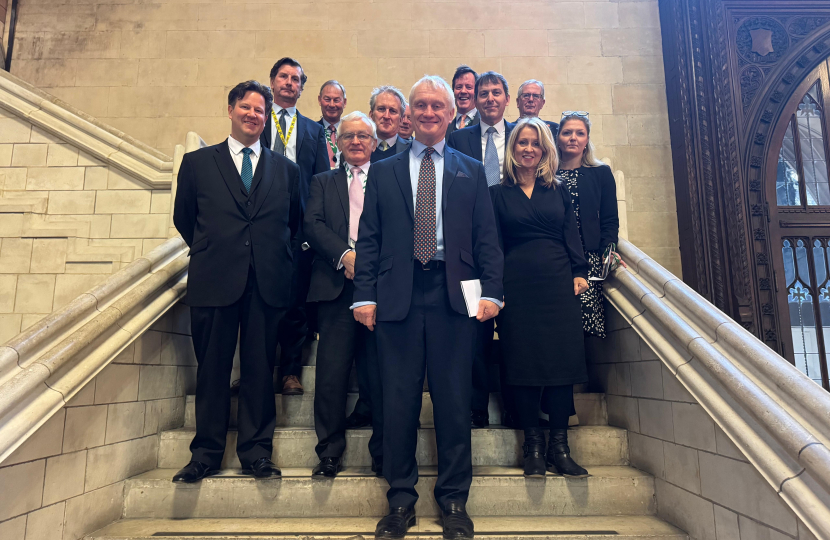In a well-attended debate in Westminster Hall, Exchequer Secretary to the Treasury James Murray (Lab, Ealing North) failed to give an effective response to MPs asking whether the government had considered the impact of the Family Farm Tax on small businesses.
The time-limited 30 minute debate, led by veteran Conservative MP for Beverley and Holderness Graham Stuart, called on the government to consider the impact of planned changes to Agricultural Property Relief and Business Property Relief on small businesses.
Sir Alec Shelbrooke (Con, Wetherby and Easingwold) raised the damage which would be caused by farmers being forced to sell up to management of the water courses while Jim Shannon (DUP, Strangford) told the minister that as land values have skyrocketed (a 369% increase over 30 years) the vast majority of farms are now worth more than the £1 million threshold.
Graham highlighted the risk that once a family farm goes, it’s gone forever, with the resultant impact on rural communities and economies, as Sir Keir Starmer himself said to the NFU Conference in February 2023 (and repeated by the Environment Secretary Steve Reed), before he decided to bring in this measure.
Minister James Murray, sitting alone on the Labour benches, could only sit as the onslaught grew with interventions coming thick and fast from MPs eager to tell the government just how damaging the Family Farm Tax will be for not just farmers, but to waterways, food security, the environment, the rural economy and more.
Ester McVey (Con, Tatton) gave the minister food for thought as she compared the Family Farm Tax to state theft of land, jeopardising the UK’s food security as Harriet Cross (Con, Gordon and Buchan) told Murray that the new tax destroys any incentive for farmers to invest in their businesses.
David Doogan (SNP, Angus) raised that the UK has some of the lowest prices for fresh produce in Europe while Seamus Logan (SNP, Aberdeenshire North) highlighted that the government has failed to give any evidence on why the £1 million threshold was decided on by the government.
John Glen (Con, Salisbury) highlighted that it’s not just the Family Farm Tax, but other decisions made by the government, which will damage particularly elderly farmers – a concern also raised by Freddie Van Mielo (Lib Dem, Henley Upon Thames) who spoke movingly about the mental health of farmers as the Minister looked on, unsupported by a single Labour MP as the opposition were united in the systematic unpicking of this policy.
Summarising the arguments of around a dozen MPs, Graham highlighted the fact that Labour made a great play of speaking to rural communities and indeed won over 40 seats in July’s election. They promised us that they would listen to farmers and work with them. Those promises now lie in tatters as 66% of the British public don’t believe that Labour is good for rural communities.
The Minister could only repeat the government’s lines that this was an attempt to make the tax system fairer and more sustainable – a claim swiftly brought down by Richard Ford (Lib Dem, Tiverton and Sidmouth).
Murray continued in his valiant attempt to defend the policy, claiming that only around 520 estates a year will pay APR or BPR – a figure strongly disputed by the National Farmers Union.
The Family Farm Tax was announced in the Budget at the end of October, which saw tens of thousands of farmers march on Westminster.
This comes following numerous assurances given to farmers by Labour ministers including the Prime Minister in early 2023 and by Agriculture Secretary Steve Reed just over a year ago.
The Family Farm Tax is composed of the introduction of a 20% tax on assets over £1 million on agricultural property and business assets, which have been exempt from inheritance tax since 1984.
Agricultural land is currently valued at around £10,000 to £15,000 an acre, meaning that a farm of under 100 acres could easily be subject to the tax.
Farms often make around a 1% return on the land value – meaning that farms could spend years paying off the death duties, preventing farmers from investing in new machinery, livestock or in providing employment.
Graham recently visiting Bygot Farm just outside Cherry Burton, which will be affected by the Family Farm Tax. Graham was struck at how Ian and Rebecca, who own the farm, see the land as a part of the family, not an asset that they would contemplate selling.
While the government continued to fail to listen to the reasoned voice of Conservative, Lib Dem, and Reform MPs, Graham will continue to make the case for an end to the Family Farm Tax, which is due to be introduced in 2026.
Graham has been a loud voice in support of farmers since the election. His petition against the Family Farm Tax (www.grahamstuart.com/FarmTax) has gathered over 1,000 signatures while he’s been an active voice in Parliament against the Family Farm Tax.
Graham joined tens of thousands of farmers in Westminster in November and has met farmers to hear their stories and work to find solutions over the past few months.
Commenting, Graham said, “For the first time in forty years, farmers are being told that they will need to pay the government if they want to hand their farms on to the next generation.
“The government thinks it’s correcting an anomaly, closing a loophole, and that it’ll only affect a tiny number of farms.
“They’re wrong, plain and simple. If the Family Farm Tax comes in, it will put farms out of business.
“The damage that will do to our rural communities in Beverley and Holderness could be catastrophic.
“I’m delighted to have been able to lead this debate on the Family Farm Tax today, and I’m delighted that so many colleagues from all parties joined me.”



